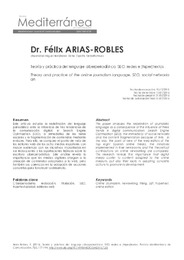Por favor, use este identificador para citar o enlazar este ítem:
https://hdl.handle.net/11000/30880Registro completo de metadatos
| Campo DC | Valor | Lengua/Idioma |
|---|---|---|
| dc.contributor.author | Arias Robles, Félix | - |
| dc.contributor.other | Departamentos de la UMH::Ciencias Sociales y Humanas | es_ES |
| dc.date.accessioned | 2024-01-31T13:11:35Z | - |
| dc.date.available | 2024-01-31T13:11:35Z | - |
| dc.date.created | 2016-07 | - |
| dc.identifier.citation | Revista Mediterránea de Comunicación (RMC) 2016, Vol. 7, N. 2 | es_ES |
| dc.identifier.issn | 1989-872X | - |
| dc.identifier.uri | https://hdl.handle.net/11000/30880 | - |
| dc.description.abstract | Este artículo estudia la redefinición del lenguaje periodístico ante la influencia de tres tendencias de la comunicación digital: el Search Engine Optimization (SEO), la inmediatez de las redes sociales y la fragmentación de contenidos mediante enlaces. Para ello, se compara el punto de vista de los editores web de los ocho medios españoles con mayor audiencia con las iniciativas implantadas en sus redacciones y las aportaciones teóricas sobre la escritura ciberperiodística. Este análisis revela la importancia que los medios digitales otorgan a la creación de contenidos adaptados a la web, pero también sus carencias en la adopción de acciones concretas para favorecer su desarrollo | es_ES |
| dc.description.abstract | This paper analyzes the redefinition of journalistic language as a consequence of the influence of three trends in digital communication: Search Engine Optimization (SEO), the immediacy of social networks and the content fragmentation because of links. In this way, the point of view of the web editors of the top eight Spanish online media, the initiatives implemented in their newsrooms and the theoretical contributions on online newswriting are compared. This research reveals the importance that digital media confer to content adapted to the online medium, but also their lacks in adopting concrete actions to promote its development. | es_ES |
| dc.format | application/pdf | es_ES |
| dc.format.extent | 18 | es_ES |
| dc.language.iso | spa | es_ES |
| dc.publisher | Universidad de Alicante [University Publisher] Grupo de investigación Comunicación y Públicos Específicos | es_ES |
| dc.rights | info:eu-repo/semantics/openAccess | es_ES |
| dc.rights.uri | http://creativecommons.org/licenses/by-nc-nd/4.0/ | * |
| dc.subject | Ciberperiodismo | es_ES |
| dc.subject | redacción | es_ES |
| dc.subject | titulación | es_ES |
| dc.subject | SEO | es_ES |
| dc.subject | hipertextualidad | es_ES |
| dc.subject | editores web | es_ES |
| dc.subject | Online Journalism | es_ES |
| dc.subject | newswriting | es_ES |
| dc.subject | titling | es_ES |
| dc.subject | hypertext | es_ES |
| dc.subject | online editors | es_ES |
| dc.subject.other | CDU::0 - Generalidades.::00 - Ciencia y conocimiento. Investigación. Cultura. Humanidades. | es_ES |
| dc.title | Teoría y práctica del lenguaje ciberperiodístico. SEO, redes e (hiper)textos | es_ES |
| dc.type | info:eu-repo/semantics/article | es_ES |
| dc.relation.publisherversion | http://dx.doi.org/10.14198/MEDCOM2016.7.2.8 | es_ES |

Ver/Abrir:
2016_Teoría y práctica del lenguaje ciberperiodístico. SEO, redes e (hiper)textos.pdf
297,67 kB
Adobe PDF
Compartir:
 La licencia se describe como: Atribución-NonComercial-NoDerivada 4.0 Internacional.
La licencia se describe como: Atribución-NonComercial-NoDerivada 4.0 Internacional.
.png)